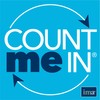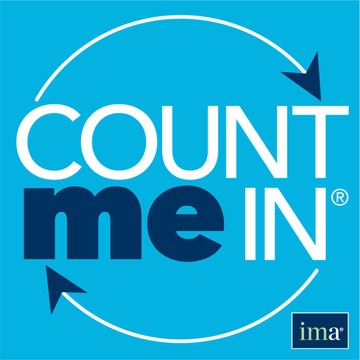

Count Me In®
IMA® (Institute of Management Accountants)
IMA® (Institute of Management Accountants) brings you the latest perspectives and learnings on all things affecting the accounting and finance world, as told by the experts working in the field and the thought leaders shaping the profession. Listen in to gain valuable insight and be included in the future of accounting and finance!
Episodes
Mentioned books

Jul 29, 2024 • 27min
Ep. 273: Corey Noyek - Overcoming Silo Mentality in Organizations
Join host Adam Larson on this insightful episode of Count Me In Podcast as he sits down with Corey Noyek, Vice President of Finance & Operations at Cardata. Corey shares his passion for breaking down silos and fostering an environment where diverse perspectives thrive. Tune in to hear practical strategies for improving communication between departments, navigating the challenges presented by virtual work, and leveraging technology responsibly. Corey also offers valuable tips on maintaining a curiosity mindset, asking the right questions, and ensuring every team member feels heard. Whether you're a manager looking to boost your team's cohesion or just curious about improving workplace dynamics, this episode is packed with actionable advice and engaging conversation. Don't miss it!

Jul 22, 2024 • 27min
Ep. 272: Luke Deka - Key Strategies for SMB Accountants in Outbound Sales
Join Adam Larson as he chats with Luke Deka, the Chief Executive Officer and Founder of Growbots, about overcoming outbound sales challenges in small and medium-sized businesses. Luke shares his wealth of expertise, offering practical advice for accountants looking to move beyond referrals and confidently approach outbound sales.In this episode, you’ll learn:How to transition from referral-based growth to proactive outreachEffective techniques to stand out in today's digital marketplaceThe role of AI in enhancing outbound sales effortsStrategies for personalizing your message and measuring successLuke provides real-world examples and actionable steps to help elevate your sales game. Whether you’re an experienced accountant or just starting out, this episode is packed with valuable insights to help you scale your business.

Jul 15, 2024 • 26min
Ep. 271: Pooja Sund - Foundations for Successful AI Implementation
Get ready for an engaging conversation with Adam Larson and special guest Pooja Sund, Engineering Finance Leader at Microsoft, on this episode of Count Me In! Pooja, a finance and AI expert, breaks down the fascinating differences between AI and traditional programming, shedding light on how AI is revolutionizing the financial industry.From risk management and fraud reduction to personalization and sentiment analysis, discover how AI can be a game-changer for your business. Plus, learn about the crucial aspects of security, privacy, and bias when implementing AI solutions. Whether you're a business leader, finance professional, or tech enthusiast, you won't want to miss this insightful episode packed with practical takeaways and future-forward thinking.Tune in and supercharge your understanding of AI's potential in today's dynamic landscape!

Jul 8, 2024 • 14min
Ep. 270: Jane Sarah Lat - Mastering Data Integrity
Join host Adam Larson as he sits down with data integrity expert and author, Jane Sarah Lat, to uncover essential insights from her book, Managing Data Integrity for Finance. Jane breaks down the critical concepts of data integrity and data quality, using relatable analogies and real-world applications.In this episode, Jane shares the importance of maintaining accurate and reliable data in today's tech-driven finance landscape. She highlights the tools and techniques that can elevate your data game, including Google Sheets, Microsoft Excel, powerful business intelligence tools like Power BI and Tableau, and the advanced Amazon Quantum Ledger Database.But that's not all! Jane also touches on the exciting rise of generative AI and its potential impacts on data integrity. Whether you’re a finance professional looking to upskill or just a curious learner, this episode is packed with practical tips and valuable insights. Don’t miss out—tune in and elevate your understanding of data integrity today!

Jul 1, 2024 • 26min
Ep. 269: Brett Kelly - Lessons in Leadership and Strategic Insights
Get ready for an inspiring journey on this episode of Count Me In! Join host Adam Larson as he sits down with Brett Kelly, the dynamic founder of Kelly Partners. From his humble beginnings in Australia to building a global accounting firm with offices in Los Angeles, Hong Kong, and Mumbai, Brett shares his extraordinary story of resilience, ambition, and the power of self-education. Discover how Brett turned adversity into opportunity, spoke to 80 prominent Australians, and self-published a best-selling book that skyrocketed his career. With captivating insights and practical advice, Brett emphasizes the importance of finding your true mission, surrounding yourself with the right people, and making a meaningful impact. Tune in and get inspired to follow your passion and leave a lasting legacy. Don't miss out on this engaging conversation that's bound to ignite your own drive for success!

Jun 24, 2024 • 28min
Ep. 268: Jean Pierre Rukebesha - Using AI to Help Small Businesses Thrive
Join host Adam Larson as he welcomes Jean Pierre Rukebesha, Co-Founder and CEO of Rukbe Tech, in an episode that highlights the seamless blend of accounting expertise and tech innovation. Jean Pierre shares his inspiring journey from growing up in Rwanda to becoming a pioneering entrepreneur in Canada. Discover how his background in accounting led him to create groundbreaking technological solutions for small businesses.Jean Pierre’s story is filled with insightful anecdotes, hard-earned lessons, and actionable advice for aspiring entrepreneurs and tech enthusiasts alike. Tune in to hear about the power of financial literacy, the importance of finding your "why," and navigating the rapidly evolving landscape of digital technology. Whether you're a seasoned business owner or just starting, this episode promises valuable takeaways wrapped in an engaging conversation.

Jun 17, 2024 • 26min
Ep. 267: Bruce Ditman - No Secret Sauce
Join us for a spirited conversation with Bruce Ditman, Chief Growth Officer at Trigger and Managing Partner at Chiefseconds.com, who shoots down the myth of the "secret sauce" in the world of success. In this lively episode of the Count Me In Podcast, host Adam Larson engages Bruce in a straightforward yet thought-provoking dialogue about the allure of complexity, sales wisdom, and the real keys to excellence. From hilarious wing-eating analogies to hard-hitting truths about behavioral changes, Bruce brings his unique perspective and energy. Whether you're a marketing professional, a leader, or someone just looking to simplify your path to success, this episode is packed with actionable insights and a good dose of humor. Tune in for a refreshingly honest look at what it really takes to achieve your goals!

Jun 10, 2024 • 30min
Ep. 266: Gaby Lahoud - Overcoming Certification Exam Psychological Barriers
Join Adam Larson in this enlightening episode of the Count Me In Podcast as he chats with Gaby Lahoud, CEO at B Certified Pro and a seasoned certification exam expert with a passion for helping exam takers succeed. Gaby shares invaluable tips on how to go beyond rote memorization and truly understand exam material, which is a game-changer for any certification exam. From tactical strategies like prioritizing easy questions and using consistent answers for the unknowns, to deeper insights on overcoming psychological barriers like doubt and test anxiety, Gaby covers it all.He also offers practical advice on integrating study sessions into a busy schedule, preparing with full-length practice exams, and maintaining a confident mindset. As they discuss everything from pacing during exams to making smart food and drink choices, you'll gain a wealth of knowledge to help you tackle your exams with confidence. Tune in and let Gaby's expertise guide you to exam success!

Jun 3, 2024 • 24min
Ep. 265: Jeremy Bryant - Storytelling's Impact: A Journey to Memory Preservation
Join host Adam Larson as he chats with Jeremy Bryant on the Count Me In Podcast in a refreshing and insightful conversation. Hear about Jeremy's inspiring journey from accounting to entrepreneurship, real estate, and his latest venture, No Story Lost. Get ready for engaging stories and valuable insights straight from the guest himself.Count me in listeners can receive a special discount by going to nostorylost.com and entering the code Podcast2024 for 2 free books.

May 27, 2024 • 34min
Ep. 264: Douglas Boyle and Dana Hermanson - The Fraud Prevention Pyramid Explained
Join us for an insightful episode of Count Me In as Adam Larson sits down with the authors of the 2023 Curt Verschoor Ethics Feature of the Year, Dana Hermanson and Douglas Boyle. Dana, the Dinos Eminent Scholar Chair of Private Enterprise and professor of accounting at Kennesaw State University, and Douglas, professor and department chair in accounting at the Kania School of Management at the University of Scranton, share from their award-winning article. In this episode, they introduce the Fraud Prevention Pyramid, a crucial framework with five stages to help professionals build resilience against fraud.Dana offers practical advice on preparing for and defending against pressure in the accounting world, while Doug emphasizes the role of emotional intelligence in recognizing and mitigating fraud risks. Discover tips on navigating ethical dilemmas, avoiding common pitfalls, and the importance of skepticism in today's tech-driven landscape. Whether you're an accounting student or a seasoned professional, this episode is packed with valuable insights to enhance your fraud prevention acumen and ensure integrity in your financial reporting. Tune in for a conversation that's both enlightening and essential for anyone in the field of finance and accounting!


